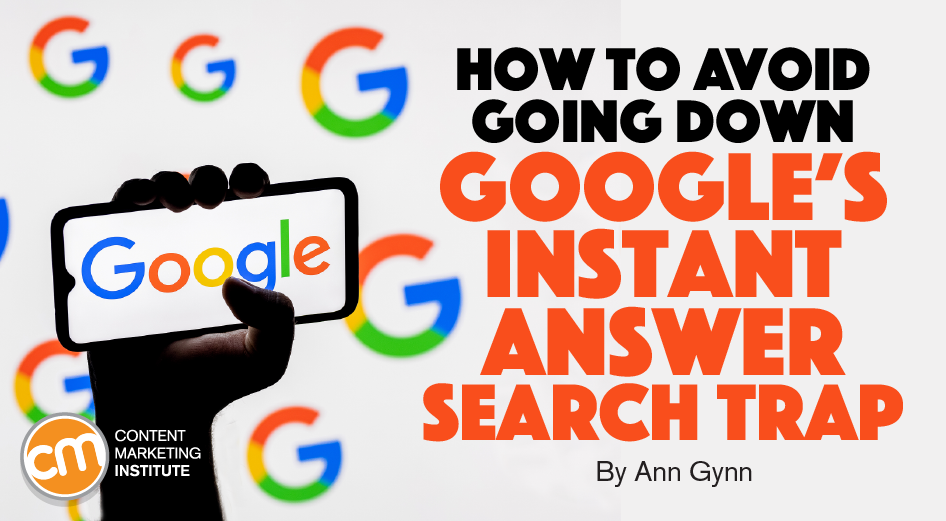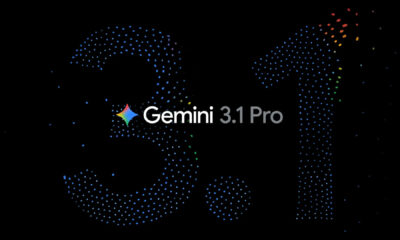MARKETING
How To Avoid Going Down Google’s Instant Answer Search Trap

Editor’s note: This week, we’re giving everyone a taste of Content Marketing World 2022 by featuring recaps of articles filled with insights from this year’s speakers.
For years, marketers claimed victory when their page made it to the first organic listing or even a first page ranking on a Google search results page.
Now zero-click and other featured results deliver answers immediately to searchers and bury those organic links further down (or even off the first) page. What’s a content marketer to do?
Here’s what 10 experts presenting at Content Marketing World suggest.
1. Build brand and community
The instant answers are answers that are easy. Even with featured snippets, if your content is tackling a complex subject matter, Google will still refer people to your site. That said, you want an insurance policy against Google, and that policy contains two things: brand and community. Build both, and SEO will work for you, but more importantly, your marketing will work without SEO. – Christopher Penn, chief data scientist, TrustInsights.ai
You want an insurance policy against @Google that contains two things: brand and community, says @cspenn via @CMIContent. #SEO #CMWorld Click To Tweet
2. Pay attention to the details
Even though most searches do not end in a click, your content can still get attention on the SERP. This is where metadata matters most. Make sure the results showing up on Google are the results people are looking for. Answer questions directly in your meta descriptions or give people a good reason to click through and learn more. – Ahava Leibtag, founder and president, Aha Media Group
Answer questions directly in your meta descriptions or give people a good reason to click through and learn more, says @ahaval via @CMIContent #CMWorld #SEO Click To Tweet
3. Go beyond the instant
Optimization and a savvy understanding of the search landscape are the best way to own the instant answer space. Many searches don’t trigger an instant answer, so SEO is crucial to impact those search results. And even with the instant answer, there are still 75% to 90% of organic clicks available, and SEO is the best way to win that traffic. Finally, when done correctly, SEO is an excellent way to understand your audience and create content that speaks to them, answers their questions, and supports them along their journey. – Katie Tweedy, associate director of content marketing and SEO, Collective Measures
#SEO and a savvy understanding of the search landscape are the best way to own the instant answer space, says @katie_tweedy_ via @CMIContent #CMWorld Click To Tweet
4. Expand your horizons
I love the Lee Odden quote, “Content is the reason search began in the first place.” The instant answers in Google may increase click-throughs, so it’s important to structure your content appropriately (e.g., FAQ schema) to try to get those placements.
But ultimately, SEO-plus-content strategies must continue to co-exist so that great content can be found. Those looking for in-depth, valuable, and engaging resources will not stop at the first instant answer Google serves up. But you do need to make sure your content is differentiated, comprehensive, and more engaging than the search results you’re competing against. – Ali Orlando Wert, director of content strategy, Qlik
#SEO-plus-content strategies must continue to co-exist so great content can be found, says @AliOrlandoWert via @CMIContent. #CMWorld Click To Tweet
5. Skip the glossary content
Google gives instant answers to short questions, satisfying fact-intent queries super fast. So an SEO strategy based on content that gives short answers is death. It’s not going to work. The let’s-build-a-search-optimized-glossary strategy doesn’t work anymore.
But an SEO strategy based on content that gives detailed, long-form answers to big questions is still super effective. The let’s-publish-search-optimized-best-practices-for-our-industry strategy works great. – Andy Crestodina, co-founder and chief marketing officer, Orbit Media Studios
The let’s-build-a-search-optimized-glossary strategy doesn’t work anymore, says @Crestodina via @CMIContent #CMWorld. #SEO Click To Tweet
6. Make it all about business
I’m afraid SEO is becoming a vanity metric. Many marketing managers I know can’t answer a simple question: why do you want your brand to be the No. 1 in a Google search? If SEO isn’t connected to your business model, take a step back and analyze why you should invest time and money in that. – Cassio Politi, founder, Tracto Content Marketing
If #SEO isn’t connected to your business model, analyze why you should invest time and money in it, says @tractoBR via @CMIContent. #CMWorld Click To Tweet
7. Create assets
Every time you publish a blog post, video, podcast, or even a long-form piece of social content, you’re publishing a business asset that will serve for years to come. Knowing what keywords you want to rank for and be found with will never go out of style. – Chris Ducker, founder, Youpreneur.com
Knowing what keywords you want to rank for and be found with will never go out of style, says @ChrisDucker via @CMIContent. #SEO #CMWorld Click To Tweet
8. Answer your audience
For B2B technical buyers, research shows that engineers are more likely to go 10 pages deep than they are to stop at page one. The instant answers are helpful for simple topics, but if the stakes are high or the search topic is complex, skeptical buyers will invest the time to find the most accurate results from the most credible sources. – Wendy Covey, CEO and co-founder, TREW Marketing
Skeptical buyers will invest the time to find the most accurate results from the most credible sources, says @wendycovey via @CMIContent #SEO #CMWorld Click To Tweet
9. Stop the blue link strategy
Responses that require a simple answer or SERP feature-based answer are a unique query type and important to consider in any content marketing effort. Understanding SERP features and where you succeed and don’t is critical. Also, understand the impact of SERP features like Answers and People Also Ask. SEO is about understanding the potential and how the flux connected to the SERP isn’t just about 10 blue links anymore. – Jeff Coyle, co-founder, CSO, MarketMuse
Understanding SERP features and where you succeed and don’t is critical, says @jeffrey_coyle via @CMIContent. #CMWorld #SEO Click To Tweet
10. Look for unexpected opportunities
I still see a ton of value from our search traffic, and it’s absolutely worth it to continue to use search to inspire new content ideas. I think YouTube is also an underrated area for optimization, and Google provides you with search data directly in YouTube now. – Jennifer Jordan, vice president and global head of content, Babbel
I still see a ton of value from our #Search traffic. It’s absolutely worth it to use search to inspire new #content ideas, says @jenastelli via @CMIContent. #CMWorld Click To Tweet
Update your SEO plan
You live in a zero-click, but that doesn’t mean you should only follow an instant answer path. As with everything in content marketing, reflect on your business goals and consider how your audience behaves, then update your search strategy to achieve the best for both those worlds within the current search environment.
HANDPICKED RELATED CONTENT:
Cover image by Joseph Kalinowski/Content Marketing Institute


















You must be logged in to post a comment Login